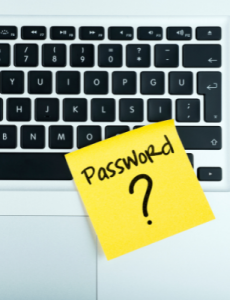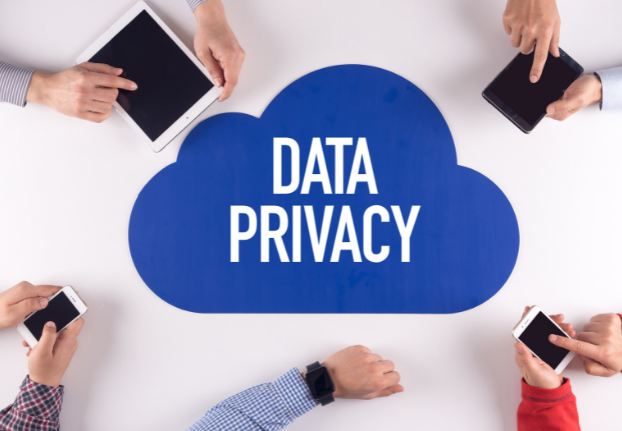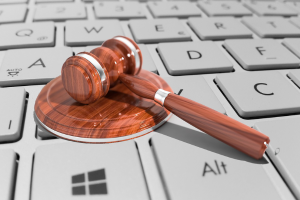
Digital Estates
Updated: October 9, 2023
If you think about how hard it is for you to keep track of all of your digital information, including everything found on your cloud account and other websites, electronic devices, thumb drives, and external hard drives, imagine how hard it would be for someone else to do it. This information is just as much a part of your estate as physical and financial assets, and you will need explicit instructions for your executor and family on how to get into your digital world after your death.

- Like other assets, you should create a list of all your online accounts and digital property, use it to create a digital estate plan, and include it in a legally binding document such as a will or trust.
- It may be best to use a codicil to your will or addendum to a living trust for your digital estate. This allows you to make these changes without having to formally change your will or trust.
- Consider other methods that may be possible with certain assets, such as joint ownership or transfer on death accounts.
- You may also want to create an ‘In Case of Emergency’ Document (PDF)” that your executor or loved ones can quickly access in urgent situations. This should contain all of your digital assets, where they can be found, how to access them, and all necessary domain names/URL addresses, domain names, usernames and passwords.
- Choose a digital executor and beneficiaries for all assets that you can name them for.
- You will need to add, revise, and update your digital estate with any changes such as new passwords, changes in the laws, and/or any accounts that are added or removed.
- Make sure to review your plan at least yearly.
There are three main categories of digital property: personal digital property, personal digital property with monetary value, and digital business property.
Personal Digital Property
- Your software and apps on computers, tablets, smartphones, digital music players, e-readers, digital cameras, flash/thumb drives, and other digital devices.
- All of your information or data stored electronically in the cloud, other online storage accounts, or on a physical device.
- Your online accounts such as email, other communications accounts, social media, shopping sites, photo and video sharing, video gaming, personal websites and blogs. You don’t own assets such as these, you have a license to use them. While they cannot be transferred after your death, the accounts need to be closed down .
- Domain names you’ve registered.
- Your intellectual property such as copyrighted material, trademarks, patents, and code you have written and own.
Personal Digital Property with Monetary Value
- Your computing hardware such as computers, tablets, smartphones, digital assistant, digital music players, e-readers, digital cameras, and other digital devices of monetary value.
- Websites or blogs you are paid for.
- Art, photos, music, eBooks, intellectual property, or other digital property you are paid for.
- Accounts that are used to manage money and hold money or credits such as PayPal, bank accounts, loyalty rewards programs, and any accounts with credit balances in your favor.
- Domain names you own the license for.
Digital Business Property
- Digital property owned by your business.
- Online accounts registered to your business.
- Any assets of an online store you manage or own such as a business website or on eBay, Etsy, or Amazon account through which you sell things.
- Any mailing lists, newsletter subscription lists, or email lists containing your business’s clients.
- Any client information, including customer history.
- Vendor information of companies your business deals with.
- Any other contracts, such as landscaping, repairmen, or snow removal.
Think about all the other electronic devices we have that store, stream, or allow us to manipulate digital information and the information on them.
Whether this is the devices listed above or your smart home device, television, Blu-ray or DVD, cable box, or watch, it is a lot to keep track of.
 These devices could hold:
These devices could hold:
- Classified files, browsing, call, credit, or purchase history;
- Saved usernames, passwords, credit card information, other personal information, private email, chats, texts, photos, location data;
- Access to information for safes, safe-deposit boxes, and alarms;
- Medical and exercise data;
- Contact information of your family and friends; and
- Financial benefits accrued over time such as loyalty points.
This is just a partial list of all the things you can do with your electronic devices for personal and business use.
- Pay your bills and file your Tax Returns online.
- Look up your medical information through a Patient Portal.
- Keep bank or retirement accounts, tax returns, investment accounts, credit card statements in cloud-based documents such as iCloud, Dropbox, and Google Docs.
- Automatically bill customers or pay employees.
- Download forms and store your important information in digital form, including Wills, Trusts, Power of Attorney, and Healthcare Proxy.
- Stream movies and TV shows, download pictures, music, and ebooks.
- Communicate and receive important information through the World Wide Web.
- Trade cryptocurrency or use it to pay for things, make money from digital information, such as websites or blogs, art, photos, music, eBooks, intellectual property, copyrighted materials, trademarks, and any code you may have written and own.
- Play interactive games with people all over the world and accumulate points or other digital assets.
If you own a business, most of your information and activities will be digital, and probably more complex. Your business is probably aided by legal and financial experts who could help you plan for its transfer after your death.
In this day and age, most people have digital information stored in numerous places, such as thumb drives, computers, or in the cloud or other online storage accounts. However, digitally stored information may only be the tip of the iceberg when it comes to your digital footprint.
 Most people have an online presence, be it email, Twitter, LinkedIn, or any of a list of websites you use on a regular basis, online groups you are part of, streaming services you use, etc. that is much longer than we would expect and may include:
Most people have an online presence, be it email, Twitter, LinkedIn, or any of a list of websites you use on a regular basis, online groups you are part of, streaming services you use, etc. that is much longer than we would expect and may include:
- One or more email or other communication accounts, including any email you have sent, received, or deleted and not trashed;
- Other online correspondence tools, such as Skype, FaceTime, Instant Messaging, iChat, WhatsApp, Facebook Messenger, and any of your data or conversations stored in them;
- Social media accounts, such as Facebook, Twitter, LinkedIn, Pinterest, etc., and any of your content (writing, photos, videos, etc.) posted to those sites and correspondences through those sites;
- Shopping accounts, including any personal information you’ve stored in your account (your credit card information, your address, etc.), your purchase history, and any credit you may have with the company;
- Photo and video sharing accounts, such as Flickr, Photobucket, Picasa, Instagram, and YouTube, including photos and video content, personal data in the account settings, and interactions you’ve had through the accounts (commenting, liking, etc.);
- Video gaming accounts, plus in-game or in-app purchases, account information, avatars, game history, and assets you’ve acquired;
- Websites and blogs, including, writing or content you’ve created for the site or blog, history of interactions with other site’s readers or users, income you may have made from the site; and/or.
- Loyalty programs (credit card, airline, car rental, hotel, etc.) and any benefits you have built up over time.
Making Online Assets Available
Your internet presence that needs to be dealt with upon your death may be enormous. Many of these websites you visit or online services you use on a regular basis have your user history, personal information, and/or credit card information.
 Since each may have a different domain name, username, and password, it can be an overwhelming process if your Power of Attorney, agent, executor, trustee, family, business partner, or beneficiaries/heirs have to manage your digital estate.
Since each may have a different domain name, username, and password, it can be an overwhelming process if your Power of Attorney, agent, executor, trustee, family, business partner, or beneficiaries/heirs have to manage your digital estate.
If they must, as it is with most of your digital footprint, it will be up to them to contact each individual server to convert or discontinue any accounts. This can be a difficult and sometimes impossible task, depending on federal law and the laws of your state.
This can be a very long process for them and the longer your accounts remain active after your death without being used, the risk of identity theft, credit card fraud, and other related problems increases. Your surviving family may be responsible for any consequences of this.
You can save lots of time, effort, and perhaps money by listing every website you have an account with including what services you use and the relevant domain names, usernames, and passwords so they can deal with these sites as soon as possible.
An app based password manager such as BitWarden or KeePass, or an online password manager such as Keeper, LastPass, 1Password, Password Boss, ZOHO, or Dashlane may be the easiest way to do this.
- These programs generate complex, secure passwords for each site and you only need to remember the password required to open the program.
- With a single password for a similar app, your executor can access most or all of your digital estate.
Other options include leaving them with your attorney or storing them in a locked file cabinet, home safe, or safe deposit box.
Less secure, but easier to use, is a browser based program such as Chrome Passwords.
Once you provide the login information to access digital information, there are a few other obstacles to settling your digital affairs, although it is a legal gray area for them to be logging on with your username and password.
Data Privacy Laws
Data privacy laws were initially created so that you were guaranteed access to any private information held by the government, insurance companies, healthcare providers, businesses, and other organizations. They eventually evolved to include preventing the sharing of this information. As the internet and digital storage of information grew, limiting the ability of others to access this information became a problem.

While it may be difficult to prevent others from acquiring certain information about you when you access the internet, there is a lot of information that you are able to protect by the simple process of only sharing things like credit card numbers, social security numbers, and addresses with sites you trust to protect them.
Recent federal and some state data privacy laws now prevent online account service providers from revealing the contents of your active websites to anyone else without your lawful consent. In fact, most of these websites that guard your private information will lock up your account without a death certificate, unless you have a document that names a legacy contact who will have your permission to access it if you are incapacitated or after your death.
Unfortunately, this information is usually buried in the “Terms of Service,” the required agreement when you sign up for a service which most users don’t read. This can make it difficult or even impossible for someone to access your account after your death.
There are a few organizations that may be able to help.
- Facebook, Gmail, and iTunes are among the few providers that attempt to cooperate after your death, despite these laws.
- Some sites such as Google, Facebook and Gmail may allow you to request an option while you are alive to name a person who will be allowed to access the account after your death.
- Google has an Inactive Account Manager that allows you to name someone who will be notified if your account has been inactive for a certain period of time.
- Facebook allows you to name a legacy contact who may know some of your account data when they need to manage your site if you can’t and/or have permission to manage your account after you die.
However, to be absolutely certain that you have someone to manage these accounts, you must make these requests official by including them in your Will or a Trust.
Another option is to simply have your account deleted after your death.
Apple services will often delete all contents and terminate your account upon being notified of your death, rendering any files unrecoverable.
As of October 2023, California, Colorado, Connecticut, and Virginia are the only states with active individual data privacy laws. Delaware, Iowa. Indiana, Montana, Oregon, Tennessee, Texas, and Utah have passed comprehensive privacy laws that will go into effect soon. Alaska, Louisiana, Massachusetts, Michigan, North Carolina, New Jersey, New York, Ohio, Pennsylvania, Rhode Island, and Vermont are considering them.
Criminal Unauthorized Access Laws
Both state and federal laws prohibit unauthorized access to your computer system and/or personal data, also known as computer hacking. All 50 states have computer crime laws against unauthorized access or computer trespass. Some state laws have other specific types of computer crime, such as spyware, phishing, denial of service attacks, and ransomware.
 These laws serve to protect you against fraud and identity theft, but would make it almost impossible for executors and/or family members to gain access to your digital assets and information if there were no regulations to overcome them.
These laws serve to protect you against fraud and identity theft, but would make it almost impossible for executors and/or family members to gain access to your digital assets and information if there were no regulations to overcome them.
47 states have passed a law created by the Uniform Law Commission called the Revised Uniform Fiduciary Access to Digital Assets Act (2015). This law gives a fiduciary, such as your family, executor, or the person appointed by the court (“conservator”) the right to access and manage your assets after death.
There are general guidelines, which assets can be accessed varies from state to state.
- These guidelines allow a designated fiduciary to access digital property such as computer files, web domains, and virtual currency.
- They do not allow access to web communications such as email, text messages, or any social media accounts, unless specifically given permission by authorizing them to access it in your will or living trust.
- State-specific laws can be found at Computer Crime Statutes from the National Conference of State Legislatures website.
These laws are changing to keep up with the digital world, but it is difficult with the rapid changes in the internet.
You could name a Digital Executor, who would be the person most familiar with computers and the internet. Since most states do not recognize this as a distinct entity, you may name an executor who knows they are responsible for your digital estate.
Like all estate planning documents, you should specify the role with specific legal language that includes all the digital assets that need to be accessed and guidance as to what to do with each.
Examples of tasks for a Digital Executor.
- Turn your facebook page to a memorial for you.
- Sell and/or shut down your digital store.
- Give your digital media library to a person/people of your choosing.
- Circulate unpublished works.
- Archive emails that have to do with your business and delete all the others.
- Transfer virtual currency.
- Allow someone to use your online gaming accounts.
Resources
- Inventory and Checklist for Digital Assets and Digital Devices (PDF) – Society of Trust and Estate Practitioners
- State-specific Digital Estate Planning Laws. everplans website.
- The Best Password Managers for 2023. PC magazine website.
- Unauthorized Computer Access. USLegal
- A Helpful Overview Of All Your Digital Property And Digital Assets. everplans website. Accessed: October 9, 2023.
- Allen J, Hallene A. Technology Tools for Estate Planning. American Bar Accociation website. Posted: October 2022. Accessed: October 9, 2023.
- Carson A. Data privacy laws: What you need to know in 2023. Osano website. Updated: December 14, 2022. Accessed: October 9, 2023.
- Cheng M. How to Tackle Digital Estate Planning in Four Easy Steps. Kiplinger website. Posted: May 16, 2023. Accessed: October 9, 2023.
- Christian R. How Digital Estate Planning Protects Your Online Legacy. The Penny Hoarder website. Updated January 18, 2023. Accessed: October 9, 2023.
- Computer Crime Statutes. National Conference of State Legislatures website. Updated: May 4, 2022. Accessed: October 9, 2023.
- Digital Cheat Sheet: How To Create A Digital Estate Plan. everplans website. Accessed: October 9, 2023.
- Digital Estate Planning: How To Organize All Your Digital Property and Assets. everplans website. Accessed: October 9, 2023.
- Estate planning for the digital era. Fidelity website. Updated: September 28, 2023. Accessed: October 9, 2023.
- Johnson M. Digital Estate Planning: How Digital Nomads Can Protect Their Digital Assets. Namad Embassy website. Posted: January 14, 2022. Accessed: October 9, 2023.
- Krasnoff B. How to arrange for your digital legacy. The Verge website. Posted December 2, 2022. Accessed: October 9, 2023.
- Pinola M. Digital Estate Planning: 5 Things to Do Now to Make Things Easier in a Crisis. Consumer Reports website. Posted: May 4, 2022. Accessed: October 9, 2023.
- Reed E. What Is Digital Estate Planning?
smartasset website. Updated: May 27, 2023. Accessed: October 9, 2023. - Rosefelt R. What Is Digital Estate Planning? How To Prepare. FindLaw website. Updated: July 24, 2023. Accessed: October 9, 2023.
- Welekwe A. A Guide to the Federal and State Data Privacy Laws in the U.S. comparitech website. Updated: October 19. Accessed: October 9, 2023.
- Why You Should Think About Your Digital Assets Before You Die. AAP website. Updated: December 29, 2021. Accessed: October 9, 2023.
